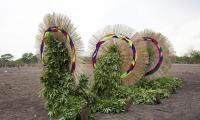 In the contemporary discussions regarding post-colonial Europe, the concepts of memory and post- memory have taken on growing importance, giving prominence to an insight with great political relevance: colonialism never ends with those who enforced or suffered it. Traces of a colonial mindset impregnate generations to come and it has been passed down through the image of the former coloniser and the former colonised. These characters restage a complex phantasmagoria closely related to the most intimate ghost of the European subconscious: its colonial ghost which manifests itself inter alia in the form of a colonial “transfer of memory” – as racism, segregation, exclusion, subalternity – or in the form of “eruptions of memory”, and thereby questions the very essence of European multicultural societies, shaped by colonial heritage and fed by waves of migration.
In the contemporary discussions regarding post-colonial Europe, the concepts of memory and post- memory have taken on growing importance, giving prominence to an insight with great political relevance: colonialism never ends with those who enforced or suffered it. Traces of a colonial mindset impregnate generations to come and it has been passed down through the image of the former coloniser and the former colonised. These characters restage a complex phantasmagoria closely related to the most intimate ghost of the European subconscious: its colonial ghost which manifests itself inter alia in the form of a colonial “transfer of memory” – as racism, segregation, exclusion, subalternity – or in the form of “eruptions of memory”, and thereby questions the very essence of European multicultural societies, shaped by colonial heritage and fed by waves of migration.
To read
31.10.2021 | by Margarida Calafate Ribeiro
 Today, I think that the field is challenged more than ever by the increased volatility of debates about what nations remember and consequentially forget. Monuments and memorials are being vandalized, torn down, officially removed. They can no longer be seen as simply part of an historical landscape. Much of this can be understood as battles over the historical narratives of monuments and their power, but it is also about tensions around who the nation mourns and who it sees or does not see as having a “grievable life” in Judith Butler’s term. So I see memory activism as a key site for the production of memory scholarship.
Today, I think that the field is challenged more than ever by the increased volatility of debates about what nations remember and consequentially forget. Monuments and memorials are being vandalized, torn down, officially removed. They can no longer be seen as simply part of an historical landscape. Much of this can be understood as battles over the historical narratives of monuments and their power, but it is also about tensions around who the nation mourns and who it sees or does not see as having a “grievable life” in Judith Butler’s term. So I see memory activism as a key site for the production of memory scholarship.
Face to face
25.10.2021 | by Inês Beleza Barreiros
 The exhibition Europa Oxalá is also the ideal time to deconstruct the colonial myth and the post-colonial melancholy designated as “African art”. Attributed to all artistic production that originates in the African continent, the expression has been used to differentiate it in a coarse way from all the art included in the compendiums and narratives of the universal history of art founded in the Western matrix. So-called African art was seen as an art without authorship, disconnected from the diversity of its production contexts, be they a country of North Africa, of the South or the east or west coast, be it the 14th or 20th century.
The exhibition Europa Oxalá is also the ideal time to deconstruct the colonial myth and the post-colonial melancholy designated as “African art”. Attributed to all artistic production that originates in the African continent, the expression has been used to differentiate it in a coarse way from all the art included in the compendiums and narratives of the universal history of art founded in the Western matrix. So-called African art was seen as an art without authorship, disconnected from the diversity of its production contexts, be they a country of North Africa, of the South or the east or west coast, be it the 14th or 20th century.
To read
18.10.2021 | by António Pinto Ribeiro
 The long history of advocacy around “women’s rights are human rights” features activists from the Global South and women of color in the US. For instance, in 1945, at the founding of the United Nations, Latin American feminists played a critical role in trying to advance “women’s rights” into the category of human rights. And after World War II, when the US Black freedom movement often deployed human rights arguments, Pauli Murray, the attorney, feminist, and civil rights advocate, argued specifically that “women’s rights are a part of human rights.” What changed at the end of the 20th century was that a far-reaching and expanding global feminist movement began to collectively use the idea that “women’s rights are human rights” to advocate for change at the United Nations and beyond.
The long history of advocacy around “women’s rights are human rights” features activists from the Global South and women of color in the US. For instance, in 1945, at the founding of the United Nations, Latin American feminists played a critical role in trying to advance “women’s rights” into the category of human rights. And after World War II, when the US Black freedom movement often deployed human rights arguments, Pauli Murray, the attorney, feminist, and civil rights advocate, argued specifically that “women’s rights are a part of human rights.” What changed at the end of the 20th century was that a far-reaching and expanding global feminist movement began to collectively use the idea that “women’s rights are human rights” to advocate for change at the United Nations and beyond.
Body
08.10.2021 | by Lisa Levenstein
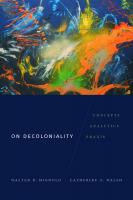 There is no Afro-Brazilian art student I have met who is not enthusiastic about Mbembe’s thoughts. This is definitely a good sign; an expression of the growing debate about racism, hidden for too long in Brazil. The current political situation does not leave space anymore for denial. It is also a reflection of two factors: firstly, the complexity of the relation between decoloniality and globalisation in the South; and secondly, the relation between publishing policies and the circulation of critical thought.
There is no Afro-Brazilian art student I have met who is not enthusiastic about Mbembe’s thoughts. This is definitely a good sign; an expression of the growing debate about racism, hidden for too long in Brazil. The current political situation does not leave space anymore for denial. It is also a reflection of two factors: firstly, the complexity of the relation between decoloniality and globalisation in the South; and secondly, the relation between publishing policies and the circulation of critical thought.
To read
07.09.2021 | by Laura Burocco
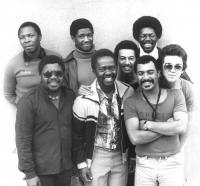 And so, as we engage with vinyl reissues such as these, we are also engaging in a fight against forgetting much more than just music. These are valuable artifacts of South Africa’s musical history that were transcendent of repressive daily conditions. Challenges remain in the here and now. The vibrant, radical artists of today’s South African jazz are the descendants of such soothsayers of the non-verbal, speaking truth to that which cannot be silenced. They are still learning to look at themselves differently, still redreaming the world, hidden gods speaking from within them a new language we will all need to learn in order to talk to each other. It’s about much more than just music.
And so, as we engage with vinyl reissues such as these, we are also engaging in a fight against forgetting much more than just music. These are valuable artifacts of South Africa’s musical history that were transcendent of repressive daily conditions. Challenges remain in the here and now. The vibrant, radical artists of today’s South African jazz are the descendants of such soothsayers of the non-verbal, speaking truth to that which cannot be silenced. They are still learning to look at themselves differently, still redreaming the world, hidden gods speaking from within them a new language we will all need to learn in order to talk to each other. It’s about much more than just music.
Games Without Borders
21.08.2021 | by Liam Brickhill
 Rather than perceiving a national museum as a mere repository of cultural artefacts emblematic of either the elite’s values or its fetishization of those it excludes and rejects, the curators of Slavery have fully embraced their educational responsibility and their duty to actively contribute to cultural life in the present. All of which cannot prevent a feeling from remaining, that the fires of purgatory still rage on and much must yet be done to extinguish them.
Rather than perceiving a national museum as a mere repository of cultural artefacts emblematic of either the elite’s values or its fetishization of those it excludes and rejects, the curators of Slavery have fully embraced their educational responsibility and their duty to actively contribute to cultural life in the present. All of which cannot prevent a feeling from remaining, that the fires of purgatory still rage on and much must yet be done to extinguish them.
To read
15.08.2021 | by Paulo de Medeiros
 From the 14th of July, the website of the Tchiweka Documentation Association (ATD) is open to the public, putting online a large part of the archive that, since 2006, its Documentation Center has been managing, organizing and expanding.
From the 14th of July, the website of the Tchiweka Documentation Association (ATD) is open to the public, putting online a large part of the archive that, since 2006, its Documentation Center has been managing, organizing and expanding.
I'll visit
13.07.2021 | by Associação Tchiweka de Documentação
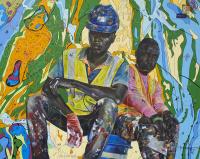 Jean’s aim is to give these people and their frustrations a voice, and to make the viewer confront their own perspectives on migration. “I think a lot about the indifference that characterizes the complicit silence of the rest of the world towards victim states,” he says. “I’m inviting an awareness necessary to free the world from these dehumanizing practices.”
Jean’s aim is to give these people and their frustrations a voice, and to make the viewer confront their own perspectives on migration. “I think a lot about the indifference that characterizes the complicit silence of the rest of the world towards victim states,” he says. “I’m inviting an awareness necessary to free the world from these dehumanizing practices.”
Games Without Borders
01.07.2021 | by Jean David Knot and Alex Kahl
 Hoje o Tarrafal é um museu e monumento nacional e, desde 2004, integra a lista indicativa de Património Mundial da UNESCO. Portugal, para além de ter ajudado com a criação e desenvolvimento deste museu, anunciou em 2019 que iria apoiar Cabo Verde com a sua candidatura do Tarrafal à UNESCO. Recentemente, foram levadas a cabo obras de restauro do espaço, por uma empresa portuguesa, e no próximo 5 de Julho, os governos de Cabo Verde e Portugal vão assinar um memorando de entendimento para a candidatura deste espaço à UNESCO.
Hoje o Tarrafal é um museu e monumento nacional e, desde 2004, integra a lista indicativa de Património Mundial da UNESCO. Portugal, para além de ter ajudado com a criação e desenvolvimento deste museu, anunciou em 2019 que iria apoiar Cabo Verde com a sua candidatura do Tarrafal à UNESCO. Recentemente, foram levadas a cabo obras de restauro do espaço, por uma empresa portuguesa, e no próximo 5 de Julho, os governos de Cabo Verde e Portugal vão assinar um memorando de entendimento para a candidatura deste espaço à UNESCO.
Mukanda
24.06.2021 | by Sofia Lovegrove
 Though based in Amsterdam, Lyuba has made work all over the world – from Japan to Aruba – at art residencies or as a visiting teacher. Wherever she goes, she researches the myths and tales told in that place as inspiration for the characters she builds and the masks they wear. Lyuba is fascinated by Joseph Campbell’s theory of artists as shamans who create the myths that reflect our reality. “Shamans use masks to travel to different realities, to travel to different worlds,” she says, “And in a way I do the same through my artwork.”
Though based in Amsterdam, Lyuba has made work all over the world – from Japan to Aruba – at art residencies or as a visiting teacher. Wherever she goes, she researches the myths and tales told in that place as inspiration for the characters she builds and the masks they wear. Lyuba is fascinated by Joseph Campbell’s theory of artists as shamans who create the myths that reflect our reality. “Shamans use masks to travel to different realities, to travel to different worlds,” she says, “And in a way I do the same through my artwork.”
To read
18.06.2021 | by Lyubov Matyunina and Alix-Rose Cowie
 He titles all of his works Bug Report, named after the message you might see on a computer screen to tell you about program errors or defects. No matter how complex and polished his diagrams and blueprints might seem, he wants to make it clear that they can still be flawed and faulty. “In any highly controlled system, it can hardly be said that there is no possibility of an error,” he says. “There are always some questions around security in this seemingly complete world. In my drawings, the thread is a material symbolizing the imperfect structure of society.”
He titles all of his works Bug Report, named after the message you might see on a computer screen to tell you about program errors or defects. No matter how complex and polished his diagrams and blueprints might seem, he wants to make it clear that they can still be flawed and faulty. “In any highly controlled system, it can hardly be said that there is no possibility of an error,” he says. “There are always some questions around security in this seemingly complete world. In my drawings, the thread is a material symbolizing the imperfect structure of society.”
To read
17.06.2021 | by Keita Mori and Alex Kahl
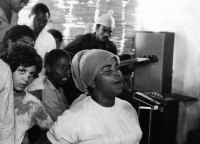 How a music shaped by slavery, epidemics, famine and mass migration travelled the world, narrating stories of suffering and resistance. Over time, morna, also known as “música rainha” (“queen music”), underwent several changes to its melodic and rhythmic characteristics, becoming the slower, more mournful version heard today. Characterised by three dimensions of melody, poetry and dance, morna is often sung in Kriolu, Portuguese-based Creole, though it can be instrumental, too.
How a music shaped by slavery, epidemics, famine and mass migration travelled the world, narrating stories of suffering and resistance. Over time, morna, also known as “música rainha” (“queen music”), underwent several changes to its melodic and rhythmic characteristics, becoming the slower, more mournful version heard today. Characterised by three dimensions of melody, poetry and dance, morna is often sung in Kriolu, Portuguese-based Creole, though it can be instrumental, too.
Stages
26.05.2021 | by Beatriz Ramalho da Silva
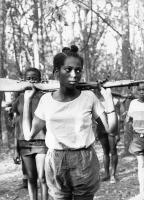 No history of decolonization or of decolonizing praxes is ever completed without attention to gender. How did women view the liberation struggles in the former Portuguese colonies? How were their ways of seeing integrated or not in the imagination of colonialism? Was there a specific gaze to women over the liberation struggles? What knowledge and awareness do we have of/about these ways of seeing? And how do these ways of seeing intersect with those of contemporary filmmakers, artists, curators and academics who are now questioning public and private archives, are visually recreating their memories or re-imagining colonialism? What role academic research, archive conservation policies, programming and curatorship have in questioning or prolonging (official) “politics of memory”?
No history of decolonization or of decolonizing praxes is ever completed without attention to gender. How did women view the liberation struggles in the former Portuguese colonies? How were their ways of seeing integrated or not in the imagination of colonialism? Was there a specific gaze to women over the liberation struggles? What knowledge and awareness do we have of/about these ways of seeing? And how do these ways of seeing intersect with those of contemporary filmmakers, artists, curators and academics who are now questioning public and private archives, are visually recreating their memories or re-imagining colonialism? What role academic research, archive conservation policies, programming and curatorship have in questioning or prolonging (official) “politics of memory”?
Afroscreen
22.05.2021 | by Ana Cristina Pereira (AKA Kitty Furtado), Inês Beleza Barreiros and Maria do Carmo Piçarra
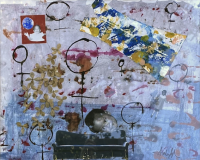 This article demonstrates that antifeminist agendas (often labelled as anti-gender ideology by proponents) are key to understand how ethnonationalist, xenophobic and racist discourses are forwarded by far-right parties in Portugal and across Europe. Therefore, it focuses on the intersections between antifeminism, including femonationalism, and anti-immigration agendas, examining how gendered and racialized tropes are used in conjunction in far-right propaganda.
This article demonstrates that antifeminist agendas (often labelled as anti-gender ideology by proponents) are key to understand how ethnonationalist, xenophobic and racist discourses are forwarded by far-right parties in Portugal and across Europe. Therefore, it focuses on the intersections between antifeminism, including femonationalism, and anti-immigration agendas, examining how gendered and racialized tropes are used in conjunction in far-right propaganda.
To read
19.05.2021 | by Rita Santos and Sílvia Roque
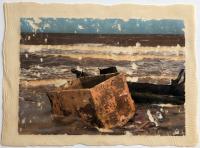 In her first solo exhibition at Simone Cadinelli Art Gallery, Jeane Terra shows works that are related, directly or indirectly, to the events in Atafona, that are about the ruins produced by the clash between the sea and the city; such events point to the fact that everything that was, is or will be built is going to turn into rubble.
In her first solo exhibition at Simone Cadinelli Art Gallery, Jeane Terra shows works that are related, directly or indirectly, to the events in Atafona, that are about the ruins produced by the clash between the sea and the city; such events point to the fact that everything that was, is or will be built is going to turn into rubble.
Mukanda
16.05.2021 | by Agnaldo Farias
 António Ole: Vital Matter gathers works from different periods of António Ole's (Luanda, 1951) multifaceted artistic journey of over fifty years. Made in various media, from sculpture to photography, from drawing to video, these works highlight the attention that Ole has devoted to nature and its vital elements and materials. The earth, water, fire and air here take on countless forms that, as a whole, invite a planetary perception and an ecological awareness not only of the cohabitation, but, above all, of the interdependence between human and non-human forms of life (animal, vegetable, mineral) – vital matter to whose urgency the pandemic itself has, more than ever, alerted us.
António Ole: Vital Matter gathers works from different periods of António Ole's (Luanda, 1951) multifaceted artistic journey of over fifty years. Made in various media, from sculpture to photography, from drawing to video, these works highlight the attention that Ole has devoted to nature and its vital elements and materials. The earth, water, fire and air here take on countless forms that, as a whole, invite a planetary perception and an ecological awareness not only of the cohabitation, but, above all, of the interdependence between human and non-human forms of life (animal, vegetable, mineral) – vital matter to whose urgency the pandemic itself has, more than ever, alerted us.
I'll visit
27.04.2021 | by Ana Balona de Oliveira
 Am I a sin to God? Religious interpretation—violence in the name of God—is killing lesbian, gay, trans, bisexual and intersex persons. They might not have killed me on that bus, but have you ever seen a bus full of people, filled with the ecstasy of God? Ready to defend his words to the sinners, to stone, to judge? Those are who we live with, eat with, ride a bus with. How are we safe?
Am I a sin to God? Religious interpretation—violence in the name of God—is killing lesbian, gay, trans, bisexual and intersex persons. They might not have killed me on that bus, but have you ever seen a bus full of people, filled with the ecstasy of God? Ready to defend his words to the sinners, to stone, to judge? Those are who we live with, eat with, ride a bus with. How are we safe?
Body
16.04.2021 | by Brindley J. Fortuin
 With a work markedly attentive to the rhythms and faces, the materials and constructions, the urban surfaces and textures – in particular, of Luanda, its slums or musseques and its islands –, from an early age Ole also observed that other Angola so dissimilar from the capital, its diverse landscapes and ways of life. António Ole: Vital Matter unveils, precisely, some of these other rhythms and textures, the vital matters beyond the walls and the skin of the city.
With a work markedly attentive to the rhythms and faces, the materials and constructions, the urban surfaces and textures – in particular, of Luanda, its slums or musseques and its islands –, from an early age Ole also observed that other Angola so dissimilar from the capital, its diverse landscapes and ways of life. António Ole: Vital Matter unveils, precisely, some of these other rhythms and textures, the vital matters beyond the walls and the skin of the city.
I'll visit
14.04.2021 | by Ana Balona de Oliveira
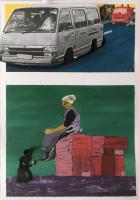 The article by Achille, I think, significantly points out the legitimacy of being limited from obtaining oxygen, by explicitly pointing out that for some parts of the world where healthcare is part of organized neglect, we are faced with more than just the need to physically breathe. There is a prohibition of breathing that is systemic in nature which is part of a larger need for the freedom to breathe (live). For example the violent killings of black civilians by the police in South Africa due to an unchecked implementation of COVID-19 laws and regulations left us questioning the relevance (need) for policing systems embedded in colonial rhetoric.
The article by Achille, I think, significantly points out the legitimacy of being limited from obtaining oxygen, by explicitly pointing out that for some parts of the world where healthcare is part of organized neglect, we are faced with more than just the need to physically breathe. There is a prohibition of breathing that is systemic in nature which is part of a larger need for the freedom to breathe (live). For example the violent killings of black civilians by the police in South Africa due to an unchecked implementation of COVID-19 laws and regulations left us questioning the relevance (need) for policing systems embedded in colonial rhetoric.
Face to face
08.04.2021 | by Marcos Jinguba